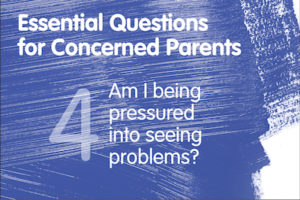 What if the instruments of society—your child’s pediatrician, your child’s teacher, your child’s principal, your child’s guidance counselor, etc.—suggest, imply or announce that your child has a mental disorder?
What if the instruments of society—your child’s pediatrician, your child’s teacher, your child’s principal, your child’s guidance counselor, etc.—suggest, imply or announce that your child has a mental disorder?
What if you are informed that he or she ought to be treated as soon as possible with a regiment of chemicals; and that to do otherwise is irresponsible on your part, endangers your child’s future in school and in life, and is tantamount to child neglect? How can you be expected to think clearly about what’s going on, feel as if you have permission to research alternatives, or not succumb to that enormous pressure? When the deck is stacked against you and your child in such powerful ways, how can you successfully resist or calmly proceed?
Step one is to recognize that you are being pressured. If someone in a position of power or a supposed expert provides you with exactly one explanation of what is going on—the mental disorder explanation—and you know that there must be multiple ways to conceptualize what’s going on, you should appreciate that their “one explanation” amounts to implicit pressure on you to believe a certain thing, to react in a certain way, and to grant the powers that be a certain permission. You are having the experience of being pressured because you are being pressured. Internally nod and say, “What I’m feeling is real. They are pressuring me!”
Read the Concerned Parents’ Project Introductory Post.
Read Question 3
To get in touch or to share your feedback, please email us.
Read more on this topic
Interview: Does Psychiatry Actually Diagnose?
You, Your Kids, Or the Doctor…Who’s Running the Show?
Visit Parent Resources for additional in-depth articles.














